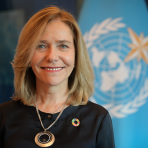Statement on the occasion of the COP29 Baku Dialogue on Water for Climate High-Level Launch
Your Excellencies, distinguished colleagues, dear participants,
It is a pleasure to join you today for the official launch of the Baku Dialogue on Water for Climate Action.
WMO is honored to have supported the COP29 Presidency in developing this initiative, and we look forward to collaborating closely on its implementation.
As we gather here at COP29, we recognize the vital role that water plays in achieving the Paris Agreement’s goals, supporting climate mitigation, adaptation and building resilience.
Yet, freshwater resources are increasingly under pressure from rising societal demands, environmental degradation and climate change-induced changes.
Last month, WMO launched the “State of Global Water Resources Report 2023.” It highlights the huge scale of these challenges.
The water cycle is spinning out of control. It is more erratic, more unpredictable and more extreme.
2023 was the driest for rivers globally in more than three decades of records. Almost half of the planet experienced lower than normal annual river flows. The world’s glaciers experienced their largest mass loss in almost fifty years of record-keeping. This is a worrying omen for future water security for billions of people.
We are suffering from more entrenched droughts, and many devasting floods. According to the law of thermodynamics, a warmer atmosphere holds more moisture and a warmer ocean fuels intense precipitation events. Every additional fraction of warming therefore increases the risk of extreme rainfall.
We cannot defeat the law of physics. We must work with it.
In view of this, WMO emphasizes the critical need for integrated water resources management as a foundation for climate resilience and adaptation.
Water is at the heart of the international disaster risk reduction agenda and the Early Warnings for All initiative. This is essential, given that water-related hazards are the leading cause of human and economic losses in many countries.
Water action and climate action are two sides of the same coin.
Water is vital for climate change mitigation as a key enabler of greenhouse gas emission reductions.
Water supports renewables like biofuels, powers hydropower, and is needed for cooling of low-emission power plants. Finally, water is essential for hydrogen and for producing minerals vital for battery technology. This makes the necessary green energy transition a thirsty business.
This is why we need integrated water and climate policies.
Water-dependent ecosystems, such as wetlands and forests, play a critical role in carbon sequestration. They also buffer floods and build resilience to droughts and temperature extremes.
At WMO, our water mandate is clear: to improve the understanding, monitoring, and management of the water resources and water-related hazards. We must ensure that reliable data and information informs every aspect of climate action and, at the same time, water action.
As we often say, we cannot manage what we do not measure. And this applies in particular to water. Improved water monitoring and data sharing is therefore vital if we are to improve integrated management of water resources and support the Sustainable Development Goals, particularly in the Global South.
National Meteorological and Hydrological Services need to play a crucial role in integrating water data and information into development policies for informed decision-making. This builds on the expertise of WMO’s national hydrological advisers
Addressing these challenges will also require significant financial investment.
Increased funding is essential to enhance water monitoring systems, implement early warning systems, and build resilience in communities vulnerable to water stress and extreme events.
WMO calls on the international community to mobilize the financial resources needed to integrate water data and information into climate finance mechanisms.
Partnerships are also key to these efforts.
WMO is the specialized UN agency for weather, climate and water. We are a dedicated partner and are committed to leveraging our expertise and mandate to support informed decision-making on the overwhelming challenge of our time: the climate crisis.
WMO flagship reports, such as the “State of the Climate” and “State of Global Water Resources”, provide robust and science-based evidence to support the Baku Dialog on Water. Our global networks of experts representing all regions of the world provide unrivalled expertise.
In our role as co-coordinator of the UN-Water Expert Group on Water and Climate Change, WMO offers comprehensive support to the UN System-wide Strategy on Water and Sanitation, this provides scientific and policy guidance on water issues within the climate agenda.
As we move forward with this initiative, WMO remains committed to supporting countries in enhancing their water monitoring and early warning systems and innovating climate change response measures.
May today’s declaration drive us towards a future where water security is the foundation of climate-resilient societies.
Let us act with urgency and collectively.
Thank you.
Statement by


